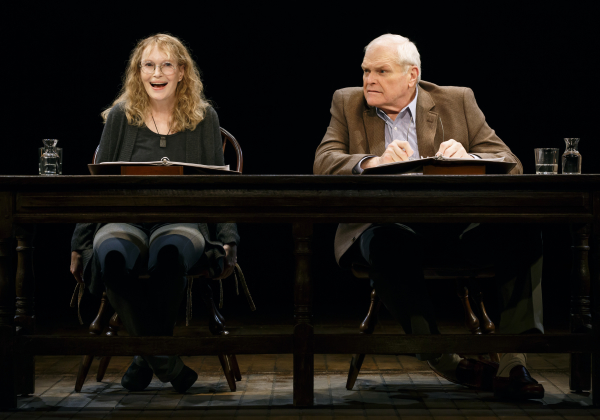Love Letters with Mia Farrow and Brian Dennehy
Big stars are set to perform in this Broadway revival of A.R. Gurney’s most popular play.

(© Carol Rosegg)
Few people write physical letters anymore. Why wait for several days for a love letter to arrive by snail mail if you can just e-mail or Facebook your sweetheart this second? If you asked A.R. Gurney, however, he'd probably tell you that a certain amount of forethought and craftsmanship has been lost in our newfound haste. At least that is apparent in his popular two-hander Love Letters, receiving a Broadway revival at the Brooks Atkinson Theatre 25 years after it first bowed in New York. While many of the play's trappings feel dusty, Gurney's astute observations about the lost opportunities of love and life are timeless.
Love Letters takes place on a bare stage. Two actors sit at a table facing the audience. They read from their scripts while wearing what might easily pass for their post-show civilian attire. The spartan nature of the show (and the fact that it requires little to no rehearsal time) is why it has been often favored for one-night-only events and benefits starring big-name celebrities.
This production is no exception. The cast is set to change monthly, with Carol Burnett, Alan Alda, Candice Bergen, and Martin Sheen, and more stars already slated for future performances. This first month stars Mia Farrow and Brian Dennehy.
The story is revealed entirely through the letters of Andrew Makepeace Ladd III (Dennehy) and Melissa Gardner (Farrow), two Northeastern WASPs coming of age in the mid-20th century. An invitation to a childhood birthday party in 1937 blossoms into a lifetime correspondence and eventually, romance. As they age, they grow apart, taking very different (although well-trod) paths afforded to the American aristocracy. Andy joins the Navy and attends Harvard law with an eye on a future in politics. "Those born to privilege have special responsibilities," he writes Melissa. Meanwhile, she blows through a couple of marriages and several addresses as she slips deeper into an alcoholic rut. As he builds his life in all the ways children of privilege are "supposed" to, hers unravels.
Farrow charts Melissa's course with subtle precision. She has the devastating presence of a wounded kitten. This extreme vulnerability is tempered by a quiet ferocity. You get the impression that she is the only person who ever tells Andy when he's being phony (as their contemporary, Holden Caulfield, might say).
Appropriately, Dennehy maintains a staid patrician demeanor, even through the particularly fraught emotional moments. It feels authentic to the time and place, an accurate manifestation of Gurney's text and rarified world.
At times this world can feel distant and arcane. Talk of caddying, The Scroll and Key Society, and "mummy" will be alien to most viewers. Of course, members of the Silent Generation (and those who love them) are sure to recognize the casual racism that occasionally pops up. "Rumor hath it you're hooked up with some little Jap bar-girl," Melissa writes to Andy, later revealing that her therapist explained how, "American men have to get involved with a dark-skinned woman before they can connect with the gorgeous blonde goddesses they really love."
Even if the curtains feel moldy, the windows they're coving are crystal clear. Love and loss are universal human experiences, as is the impulse to daydream about the road not taken. Gurney explores these themes with uncommon sensitivity, unveiling the story of two lives with the same mysterious grace one might encounter in a good novel.
Frustratingly, Gregory Mosher's production has some avoidable missteps and oversights. The actors are often buried in their scripts so that we cannot see their eyes. When they occasionally look out and listen while the other actor is reading, the stage seems to come alive. But this convention is far from uniform. More often than not, they're following along in the script. Also, the use of the Marvelettes singing "Please Mr. Postman" as exit music feels amateurish, a rimshot to the emotionally wrenching story that preceded.
Love Letters is the opposite of a spectacle and will probably be the most minimal production on Broadway this season. It's just the words, the actors, and the audience, with nothing in between. You can enjoy the text for free at nearly any public library in America, but you have to buy a ticket if you want a Golden Globe Award winner to read it to you.









